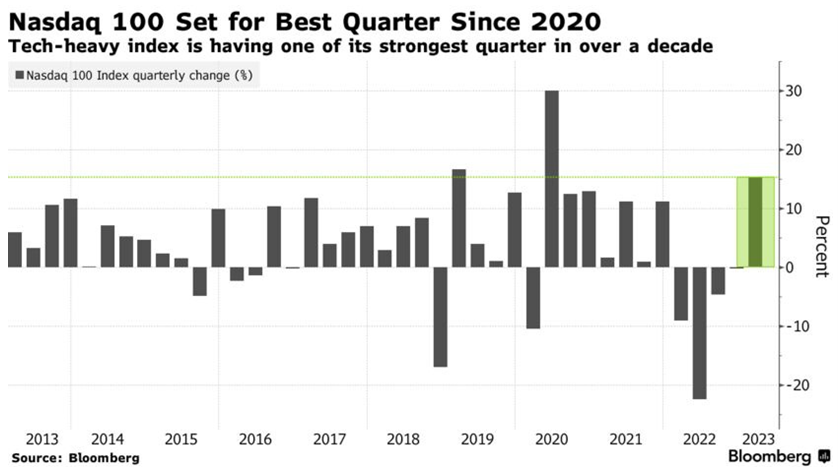Nasdaq 100 is in a bull market; Lessons from Meta Platforms' turnaround; The Metaverse Is Quickly Turning Into the Meh-taverse; Ryan Cohen's Grand Plans for GameStop Keep Shrinking; Value Investing Seminar in Italy
1) Amid the chaos in the banking sector, the tech-heavy Nasdaq 100 is now officially in a bull market, having risen 20% from its December lows.
It's on pace for its best quarter since the post-COVID-crash rally in the second quarter of 2020 and the third-best quarter in the past decade, as you can see in this chart from Bloomberg:
2) I didn't quite nail the bottom when I recommended a basket of seven big-cap tech stocks on November 7, as I discussed in last Thursday's e-mail, but I came pretty close, as they're now up an average of 45% versus 7% for the S&P 500 Index.
It's worth taking a deeper dive into Meta Platforms (META), which has risen 120% from just over $90 per share to yesterday's close of $205.35 since I wrote six consecutive e-mails from October 31 through November 7 laying out the bull case for the stock. In the last of these e-mails, I concluded:
In all five of my daily e-mails last week (Monday, Tuesday, Wednesday, Thursday, and Friday), I analyzed Meta Platforms (META) and the various factors that have caused its stock to crash 76% in the past 15 months – wiping out a staggering $773 billion in market capitalization.
Today I'd like to summarize my analysis and explain why I've concluded that Meta's stock is a pound-the-table buy right now.
In short, Meta has been buffeted by no fewer than eight headwinds that, collectively, have severely impacted the company and its stock:
- Apple's (AAPL) privacy measures
- The massive rise of TikTok
- The end of the pandemic
- The strong dollar
- Metaverse spending
- Artificial intelligence ("AI") spending to address challenges from Apple and TikTok
- Reels cannibalizing more profitable segments of Facebook and Instagram
- Weak consumer spending, especially in sectors from which Meta draws advertising
In light of this perfect storm, I think it speaks to the extraordinary strength of the business that Meta still managed to report a 20% operating margin and $4.4 billion in net income last quarter.
And here's the key...
As I go down the list, I don't think these headwinds are likely to worsen, and some might even turn into tailwinds – for example, Meta's billions in AI spending might aid advertising targeting and help Reels better compete with TikTok. And the cost cuts announced yesterday could improve margins over time (see this article on the front page of today's Wall Street Journal: Facebook Parent Meta Is Preparing to Notify Employees of Large-Scale Layoffs This Week).
I think the odds of better-than-expected results going forward are especially good given that last quarter smelled to me like a classic "kitchen sink" quarter.
This term applies when a company, knowing it's going to report bad numbers, decides that, rather than try to "put lipstick on a pig" by trying to book some one-time gains and engage in other (sadly, legal) tricks to improve reported earnings by a few pennies, instead takes every possible charge and expense ("everything but the kitchen sink," as the saying goes) to get all the bad news out and set up the stock for easy comparisons going forward.
Kitchen sink quarters are generally quite rare, but are more common when a stock is a) already down a lot... and b) there's a new CEO or CFO who can blame the terrible earnings on their predecessor and also get their stock options struck at the lowest possible price. Sure enough, three months ago Meta announced a transition to a new CFO (Susan Li, the company's vice president of finance since 2016), which took place only last week...
In summary, the year-over-year comparisons for Meta, which have been dreadful for the past year, are likely to, at the very least, stabilize – and there's a good chance they start to improve.
With the stock so universally reviled, I think there could be a rapid rush back into it in light of its cheap valuation and the heavy (25th largest) weighting in the S&P 500 Index. I could see it popping 50% on signs of stabilization, doubling on even the slightest hint of improvement in revenue growth, margins, and spending, and tripling if it actually happens.
So what has happened since then that accounts for the extraordinary performance of Meta's stock?
Well, about a quarter of it is because big-cap tech stocks were oversold at the end of last year (the six other stocks in my basket are up an average of 33%). And AI has gotten hot... And TikTok has come under pressure...
But the single biggest factor I think is that Meta has decided to stop squandering billions of dollars, especially in the metaverse. In November, it announced layoffs of 11,000 employees and earlier this month another 10,000, so in only a few months it's cut 24% of its bloated workforce. I highly doubt that these layoffs will affect revenue one iota, so just about all of the cost savings will drop straight to the bottom line.
In particular, Meta CEO Mark Zuckerberg is pivoting away from the metaverse. In a letter to employees two weeks ago, he called 2023 the "Year of Efficiency" and highlighted the company's investment in AI:
I believe that we are working on some of the most transformative technology our industry has ever seen. Our single largest investment is in advancing AI and building it into every one of our products. We have the infrastructure to do this at unprecedented scale and I think the experiences it enables will be amazing.
These are the kind of turnarounds I look for as an investor: ones that don't require the company to jump a seven-foot bar, but instead just stop being stupid...
3) Meta isn't the only company pivoting away from the metaverse, as this article in today's Wall Street Journal highlights: The Metaverse Is Quickly Turning Into the Meh-taverse. Excerpt:
The metaverse, the virtual world that was the hot thing in tech less than two years ago, is facing a harsher reality.
Disney has shut down the division that was developing its metaverse strategies, the Wall Street Journal reported this week. Microsoft recently shut down a social virtual-reality platform it acquired in 2017. And Mark Zuckerberg, who renamed Facebook as Meta Platforms to signal his seriousness about the metaverse, focused more on artificial intelligence on an earnings call last month.
Meanwhile, the price for virtual real estate in some online worlds, where users can hang out as avatars, has cratered. The median sale price for land in Decentraland has declined almost 90% from a year ago, according to WeMeta, a site that tracks land sales in the metaverse.
Meta's name change in October 2021 spurred excitement about metaverse experiences, products and platforms. But slow user adoption, driven in part by expensive hardware requirements and glitchy tech, and deteriorating economic conditions have put a damper on expectations the metaverse will drive meaningful revenue soon.
"What many people are coming to realize is that this transformation is farther away," said Matthew Ball, a venture capitalist and author of a book about the metaverse.
4) Speaking of ceasing stupidity, the story on the front page of today's WSJ highlights how former meme stock GameStop (GME) has utterly failed in its attempts to become "an e-commerce juggernaut" and "an online marketplace for buying and selling NFTs," so it's now shrinking its way to profitability: Ryan Cohen's Grand Plans for GameStop Keep Shrinking. Excerpt:
Ryan Cohen took control of GameStop in 2021 vowing to transform the faltering videogame retailer into an e-commerce juggernaut.
Meme-stock investors loved the idea. Ordinary consumers, it turns out, did not.
E-commerce sales didn't take off – they declined. Losses grew, and a succession of online-sales executives Mr. Cohen brought in left.
Last year, to little fanfare, the billionaire investor reversed course and slammed the brakes on the e-commerce push to refocus GameStop on its roughly 4,400 bricks-and-mortar stores. In other words, the original meme stock reverted to a business model with the mall at its center.
The company began slashing costs. It scrapped plans to build more warehouses to handle online orders, shut a new e-commerce customer-service center and cut several hundred corporate jobs created under Mr. Cohen.
On March 21, the cost-cutting allowed GameStop to record its first profit in two years, but revenue declined by 1%. Meme-stock investors were thrilled, and GameStop shares, which had declined by about 70% since Mr. Cohen took over as chairman in June 2021, surged that day by more than 40%.
I think what GameStop is doing is smart, which is why last Thursday I took it off my "Dirty Dozen" list of stocks to avoid.
That said, I think the most likely outcome is that the company is now back to where it was before the meme stock foolishness – a melting ice cube – which makes its $6.8 billion market cap look very rich.
GameStop trades at 1 times enterprise value to revenue versus only 0.4 times for Best Buy (BBY), which I think is a much better positioned business.
5) I'm delighted to let you know that my friend Ciccio Azzollini and I will once again be hosting – for the 19th time! – our Value Investing Seminar in Trani, Italy (attendees fly into the nearby Bari airport) on July 6 and July 7 – just over three months from now.
We limit it to 50 people, many of whom share their latest thinking on where the best opportunities lie and outline their current favorite investment idea(s). It's fun, educational, and a great addition to any European vacation! You can learn more and register here.
Here's a picture of Ciccio and me with the port of Trani in the background:
And this is what our friend Guy Spier of Aquamarine Capital posted about it last year:
Best regards,
Whitney
P.S. I welcome your feedback at WTDfeedback@empirefinancialresearch.com.




